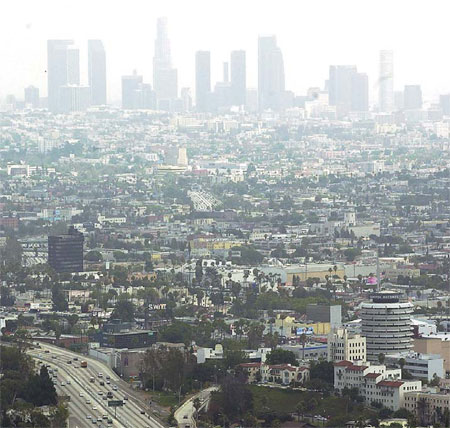
The skyline of Los Angeles obscured by a heavy layer of smog and fog on July 15, 2003. Provided to China Daily
Problems old and new
"Beijing suffers from both London's old problem (coal-fired power stations) and London's new pollution problem (traffic)," said Frank Kelly, professor of environmental health at London University's King's College.
"To improve air quality, the Chinese authorities will need to tackle both of these problems."
During London's four-day Great Smog, "people who set off in their cars in what should have been daylight had to abandon them and walk, while buses gave up and crawled back to their depots in a nose-to-tail convoy", the Daily Telegraph reported at the time.
On July 26, 1943, a pall of smoke and fumes descended on downtown Los Angeles, cutting visibility to three blocks.
Because the "gas attack" hit in the middle of a heat wave, the atmosphere was close to unbearable, leaving residents with severely sore throats and stinging eyes, according to reports in the Los Angeles Times.
In 1953, heavy November smog in New York killed between 170 and 260 people. Meanwhile, in 1954, similarly severe conditions resulted in the temporary closure of businesses and schools in Los Angeles for most of October.
The incidents triggered a series of strict, detailed laws and regulations designed to combat air pollution.
London's great smog led to the enactment of the first piece of legislation to specifically target air pollution in the world, the Clean Air Act of 1956, which was later amended and extended by the 1968 Clean Air Act.
The acts regulated the burning of solid, liquid and gaseous fuels, and increased the height of new industrial chimneys, that had not been included in previous legislation.
The efforts made by the UK government and residents were finally rewarded when the number of foggy days in London was reduced from several dozen per annum to 15 in 1975, further improving to just five days per year in 1980.
Meanwhile, the US has improved air quality by instigating strict emission standards on power plants, factories and automobiles.
The heavy smog in Beijing during the past few days has not only prompted heated discussion about comparisons between the three Western cities and the Chinese capital, but also led the public to ask questions such as, "What can we learn from the experiences of London and LA in tackling pollution". More directly people have asked, "Do we stand a chance of seeing the end of incidents such as these?"
Complicated situation
Experts said the intensity of pollution China faces today is not as severe as the US and UK experienced previously, but the scale is much larger and the causes are far more complicated.
When the developed countries tackled air pollution caused by burning coal, industrial pollution was not a major problem, and therefore they could deal with the problem incrementally, said Ming Dengli, head of the international cooperation office at the Beijing environmental bureau.
The battle against PM2.5 and ozone pollution started at a very late stage in the process.
However, Beijing's air pollution is characterized by a combination of coal-fired pollution, industrial pollution, motor vehicle emissions and dust, which have emerged almost simultaneously, he said.
"In the case of Beijing, the government has done almost everything that can be done, but with air pollution being a regional issue, there is no chance that the capital can make any significant changes in just a few days," said Zhang Lei, an associate professor focusing on studies into environmental policies at the School of Environment and Natural Resources at Renmin University of China.
However, she insisted that there are still lessons to be learned from the experiences of other cities, the first being effective implementation of the relevant laws.
It took London about 20 years to lose the nickname "The City of Fog" following the enactment of the Clean Air Act 1956. By comparison, China is still facing severe smog and haze 40 years after the introduction of relevant laws.

Copyright ©1999-2011 Chinanews.com. All rights reserved.
Reproduction in whole or in part without permission is prohibited.